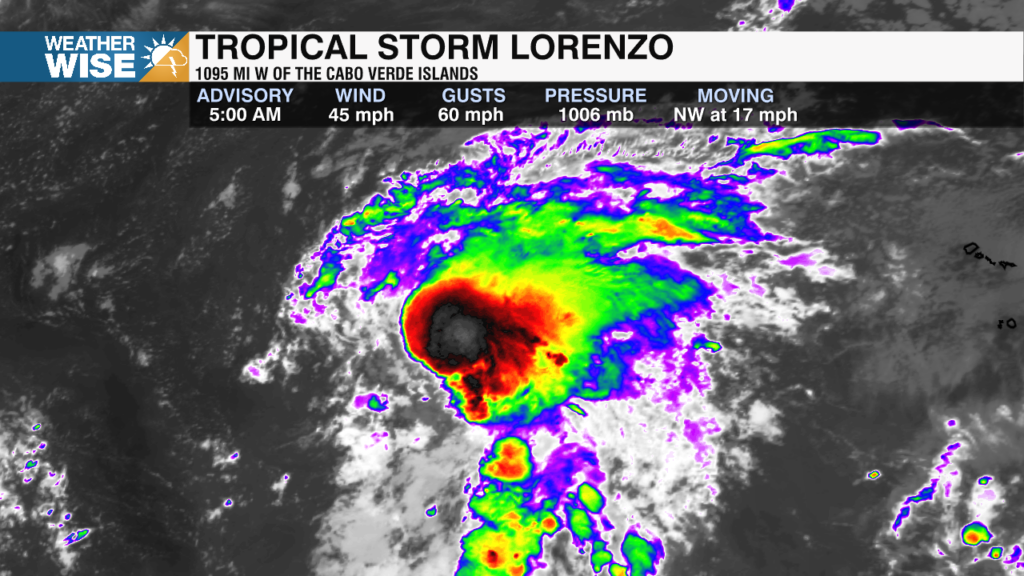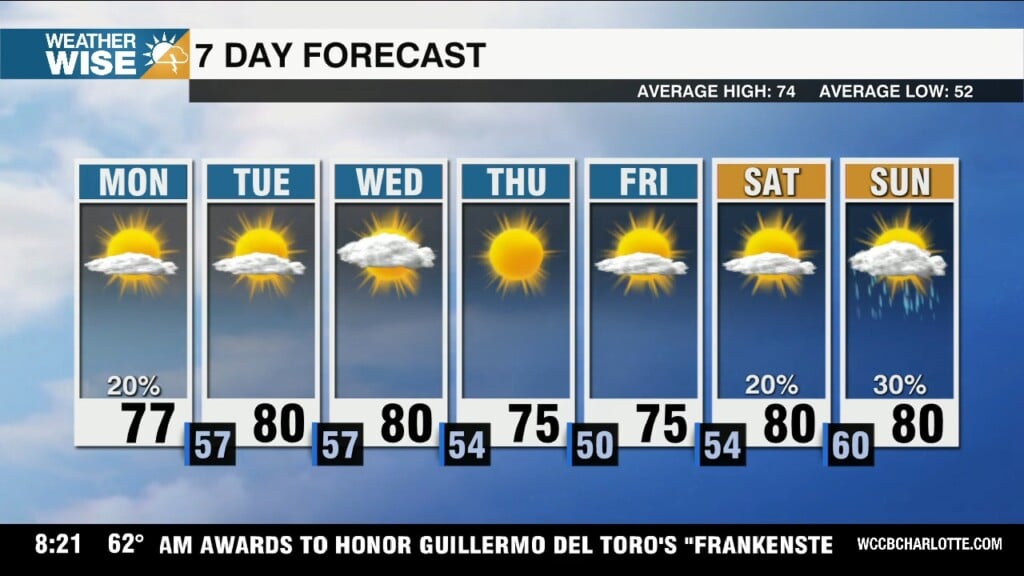WASHINGTON (AP) — President Donald Trump said Friday that he’s placing an additional 100% tax on Chinese imports starting on Nov. 1 or sooner, potentially escalating tariff rates close to levels that in April fanned fears of a steep recession and financial market chaos.
The president said on his social media site that he is imposing these new tariffs because of export controls placed on rare earth elements by China. The new tariffs built on an earlier post Friday on Truth Social in which Trump said that “there seems to be no reason” to meet with Chinese leader Xi Jinping as part of an upcoming trip to South Korea.
Trump said that “starting November 1st, 2025 (or sooner, depending on any further actions or changes taken by China), the United States of America will impose a Tariff of 100% on China, over and above any Tariff that they are currently paying.”
The announcement after financial markets closed on Friday risked throwing the global economy into turmoil. Not only would the global trade war instigated by Trump be rekindled at dangerous levels, but import taxes being heaped on top of the 30% already being levied on Chinese goods could, by the administration’s past statements, cause trade to break down between the U.S. and China.
While Trump’s wording was definitive, he is also famously known for backing down from threats, such that some investors began engaging in what The Financial Times called the “TACO” trade, which stands for “Trump Always Chickens Out.” The prospect of tariffs this large could compound the president’s own political worries inside the U.S., potentially pushing up inflation at a moment when the job market appears fragile and the drags from a government shutdown are starting to compound into layoffs of federal workers.
The president also said that the U.S. government would respond to China by putting its own export controls “on any and all critical software” from American firms.
It’s possible that this could amount to either posturing by the United States for eventual negotiations or a retaliatory step that could foster new fears about the stability of the global economy.
The United States and China have been jostling for advantage in trade talks, after the import taxes announced earlier this year triggered a trade war between the world’s two largest economies. Both nations agreed to ratchet down tariffs after negotiations in Switzerland and the United Kingdom, yet tensions remain as China has continued to restrict America’s access to the difficult-to-mine rare earths needed for a wide array of U.S. technologies.
Trump did not formally cancel the meeting with Xi, so much as indicating that it might not happen as part of a trip at the end of the month in Asia. The trip was scheduled to include a stop in Malaysia, which is hosting the Association of Southeast Asian Nations summit; a stop in Japan; and a visit to South Korea, where he was slated to meet with Xi ahead of the Asia-Pacific Economic Cooperation summit.
“I was to meet President Xi in two weeks, at APEC, in South Korea, but now there seems to be no reason to do so,” Trump posted.
Trump’s threat shattered a monthslong calm on Wall Street, and the S&P 500 tumbled 2.7% on worries about the rising tensions between the world’s largest economies. It was the market’s worst day since April when the president last bandied about import taxes this high. Still, the stock market closed before the president spelled out the terms of his threat.
China’s new restrictions
On Thursday, the Chinese government restricted access to the rare earths ahead of the scheduled Trump-Xi meeting. Beijing would require foreign companies to get special approval for shipping the metallic elements abroad. It also announced permitting requirements on exports of technologies used in the mining, smelting and recycling of rare earths, adding that any export requests for products used in military goods would be rejected.
Trump said that China is “becoming very hostile” and that it’s holding the world “captive” by restricting access to the metals and magnets used in electronics, computer chips, lasers, jet engines and other technologies.
The Chinese Embassy in Washington did not immediately respond to an Associated Press request for comment.
Sun Yun, director of the China program at the Stimson Center, said Beijing reacted to U.S. sanctions of Chinese companies this week and the upcoming port fees targeting China-related vessels but said there’s room for deescalation to keep the leaders’ meeting alive. “It is a disproportional reaction,” Sun said. “Beijing feels that deescalation will have to be mutual as well. There is room for maneuver, especially on the implementation.”
The U.S. president said the move on rare earths was “especially inappropriate” given the announcement of a ceasefire between Israel and Hamas in Gaza so that the remaining hostages from Hamas’ Oct. 7, 2023, attack can be released. He raised the possibility without evidence that China was trying to steal the moment from him for his role in the ceasefire, saying on social media, “I wonder if that timing was coincidental?”
There is already a backlog of export license applications from Beijing’s previous round of export controls on rare earth elements, and the latest announcements “add further complexity to the global supply chain of rare earth elements,” the European Union Chamber of Commerce in China said in a statement.
Gracelin Baskaran, director of the Critical Minerals Security Program at the Center for Strategic and International Studies in Washington, D.C., said China signaled it is open to negotiations, but it also holds leverage because to dominates the market for rare earths with 70% of the mining and 93% of the production of permanent magnets made from them that are crucial to high-tech products and the military.
“These restrictions undermine our ability to develop our industrial base at a time when we need to. And then second, it’s a powerful negotiating tool,” she said. And these restrictions can hurt efforts to strengthen the U.S. military in the midst of global tensions because rare earths are needed.
Trump’s trade war
The outbreak of a tariff-fueled trade war between the U.S. and China initially caused the world economy to shudder over the possibility of global commerce collapsing. Trump imposed tariffs totaling 145% on Chinese goods, with China responding with import taxes of 125% on American products.
The taxes were so high as to effectively be a blockade on trade between the countries. That led to negotiations that reduced the tariff charged by the U.S. government to 30% and the rate imposed by China to 10% so that further talks could take place. The relief those lower rates provided could now disappear with the new import taxes Trump threatened, likely raising the stakes not only of whether Trump and Xi meet but how any disputes are resolved.
Differences continue over America’s access to rare earths from China, U.S. restrictions on China’s ability to import advanced computer chips, sales of American-grown soybeans and a series of tit-for-tat port fees being levied by both countries starting on Tuesday.
Nebraska Republican Rep. Don Bacon said “China has not been a fair-trade partner for years,” but the Trump administration should have anticipated China’s restrictions on rare earths and refusal to buy American soybeans in response to the tariffs.
How analysts see moves by US and China
Wendy Cutler, senior vice president of the Asia Society Policy Institute, said Trump’s post shows the fragility of the détente between the two countries and it’s unclear whether the two sides are willing to de-escalate to save the bilateral meeting.
Cole McFaul, a research fellow at Georgetown University’s Center for Security and Emerging Technology, said that Trump appeared in his post to be readying for talks on the possibility that China had overplayed its hand. By contrast, China sees itself as having come out ahead when the two countries have engaged in talks.
“From Beijing’s point of view, they’re in a moment where they’re feeling a lot of confidence about their ability to handle the Trump administration,” McFaul said. “Their impression is they’ve come to the negotiating table and extracted key concessions.”
Craig Singleton, senior director of the China program at the Foundation for Defense of Democracies, a think tank, said Trump’s post could “mark the beginning of the end of the tariff truce” that had lowered the tax rates charged by both countries.
It’s still unclear how Trump intends to follow through on his threats and how China plans to respond.
“But the risk is clear: Mutually assured disruption between the two sides is no longer a metaphor,” Singleton said. “Both sides are reaching for their economic weapons at the same time, and neither seems willing to back down.”





